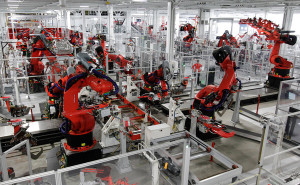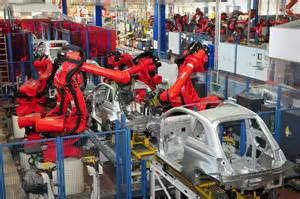Manufacturing – A guide to the manufacturing process
Manufacturing Process Guide
Seeing as manufacturing and manufacturing processes are indelibly linked to everything we do in the Process Industry, PIF decided to put together a quick guide to the manufacturing process to attune our knowledge and thinking on the subject.
What is manufacturing?
Manufacturing process is “the production of merchandise for use or sale using labour and machines, tools, chemical and biological processing, or formulation. The term may refer to a range of human activity, from handicraft to high tech, but is most commonly applied to industrial production, in which raw materials are transformed into finished goods on a large scale.”
It adds, “Such finished goods may be used for manufacturing other, more complex products, such as aircraft, household appliances or automobiles, or sold to wholesalers, who in turn sell them to retailers, who then sell them to end users – the ‘consumers.’”
What are some of the key manufacturing processes today?
The key manufacturing processes in today’s industry can be whittled down to casting, molding, forming, machining, joining, rapid manufacturing and other trades – such as mining.
What are the key developments in manufacturing technology?
There are two pivotal developments in manufacturing technology that have changed the lay of the land indefinitely.
The first is automation, which is used in different processes of manufacturing, like welding and machining. The main advantages of automated manufacturing for the manufacturing process include higher consistency and quality, reduction of lead times, simplification of production, reduced handling and improved work flow.

Then there’s robotics, which are primarily used to perform manufacturing tasks that are repetitive, dangerous or unpleasant. An engineer usually employs kinematics (to determine the robot's range of motion) and mechanics (to determine the stresses within the robot) to create a robot and they are used extensively in manufacturing engineering.
Where does manufacturing engineering fit in?
“Manufacturing engineers develop and create physical artifacts, production processes, and technology,” says Wikipedia.
“It is a very broad area which includes the design and development of products. The manufacturing engineering discipline has very strong overlaps with mechanical engineering, industrial engineering, electrical engineering, electronic engineering, computer science, materials management, and operations management.”
So broadly speaking, manufacturing engineering can have a hand in the broad spectrum of manufacturing processes from “the cradle to the grave.”
Manufacturing technology collaborations
Sometimes manufacturing technology overlaps across manufacturing sectors for the greater good. One such collaboration was announced late in 2013, when Coca-Cola and Ford announced that the same renewable material used to produce the food and beverage giant’s PlantBottle packaging would be used in the automotive leader’s fabric interiors of its Ford Fusion Energi hybrid car.
Video: Ford Fusion Energi with Coca-Cola PlantBottle Technology
“Scientists and engineers at the two companies co-developed a fiber using PlantBottle material that could be woven into durable, automotive-grade PET fabric,” said Coca-Cola.
“Coca-Cola introduced PlantBottle Technology in 2009 as the first recyclable PET plastic bottle made partially from plants. Since then, more than 18 billion PlantBottle packages have reached the market in 28 countries, saving more than 400,000 barrels of oil,” they add.
So there you have it, a whistle-stop tour of manufacturing. What new manufacturing technology has changed the way you work? Has manufacturing engineering given you a head start in industry? Manufacture your comments below.
Get the latest process industry news
Interested in receiving even more industry-leading news from Process Industry Forum delivered directly to your inbox? Then sign up to our free newsletter. Bringing you the latest news, trends, innovations and opinion from across the process industry, our exclusive newsletter gives you all the industry insights of the moment in one, easy-to-digest bulletin. Stay ahead of the competition with regular process industry news instalments from PIF.


